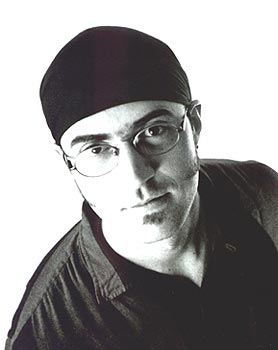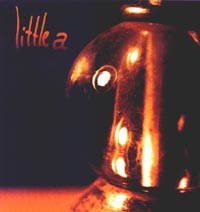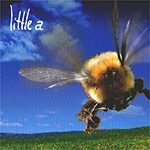BAFA © 2010. All material here is copyrighted. See conditions above. |
Bruce Grover
singer/songwriter, musician, U.S.A.
|
As a singer, I believe in singing what feels physically right, and by this I mean, how does the sound feel in my chest, throat and mouth? The music usually has a feeling to it that I write words and melodies to. For example, I love how velvety smooth a single held note can be with a lot of air in it. It feels amazing in my throat. And then chords change underneath that note, such as when I'm singing a 3rd or a 5th (something 'pretty' but basic), and I find myself suddenly singing a 9th or a flatted 13th (dissonant but beautiful).
The vibrations in my body are also added to by the sound of the guitar in the room. It's like throwing pebbles into a pond and watching their waves interact. There are times when notes feel like velvet in my throat and then turn to marbles that I roll around in my mouth and then become bubbles floating across the room. Other times for louder stuff that might have anger in it, the notes scream and are more violent physically. Because of technique, these spiky notes don't hurt me, but they do feel painful and very satisfying and cleansing.
|

Bruce Grover. Photo: Liz Linder, U.S.A.
|
As a lyricist, I've always wanted economy. I feel that less is usually more. I want the words to not only carry melodies but for them to be almost chewable, so that you can feel them in your mouth and in the ‘mouth’ of of your brain. They have a distinct reason for being in a line, in a stanza and in a song.
I also want my lyrics to be a true story. All my songs are either about me or an experience I've had. That sounds a little obsessive but writing about personal stuff can be about other people, or about God, love, death or whatever. I've always been drawn to stuff that is personal to the writer. The words have to come from some deep place. Often I don't realize what my lyrics are about until some time has passed. I love the Cocteau Twins, Joni Mitchell, Bob Marley, Ani di Franco, Seal, Radio Head, Sinead O'Connor, The Smiths, Grace Jones - people that let me know, through their sharing of experience, that I am not alone and that I'm not crazy.
My band, little a, was formed six years ago by the guitarist David Kirkdorffer and me. We met through a drummer I had played with, and we clicked immediately. We wrote three songs in our first rehearsal. David wasn't ready to commit to another musical endeavor, so he started a recording project to get some of this new material out. I sang on the songs we'd written and local radio picked up on the song 'Jane'. We kept writing together, and eventually added a drummer and bass player. We've released two CDs and four singles and had exposure from college radio to national press. We played lots of shows to support these releases and had a wonderful and sometimes frustrating time doing it. We're wrapping up CD number three and are excited 'cause it's the best thing we've ever done.
Bahá'u'lláh says there is a power that comes from working in groups. little a has been very instructive in this way - letting go (or being forced to let go) of attachments for the betterment of each song and so forth. The guitar player comes from more of an older rock place (King Crimson et al) and I come from more of a punk and folk place (The Clash, U2, Ani Di Franco, Radiohead et al). Our drummer comes from a Metal/groove background. Yet the music transcends our backgrounds and comes from the best part of each of us - the power of unity and reflection.
The song "Praise" was a gift. I walked into rehearsal and David, little a's guitarist, was playing the music to Praise. I turned on the PA, walked up to the microphone and out came with the melody. I was going through a hard time personally and started to sing words related to that. David stopped and said: "Try another subject - we have a bunch of sad songs." So, I thought for a minute and decided that the only way to get through terrible times is to be honest, to seek ways to serve others and to praise our Creator. But words are so meaningless when you attempt to praise God. So I sang and the words just came.
"How do letters strung together
and words strung together
and sentences strung together
define this
my eyes can almost see it
my tongue can almost taste it
my hips can almost feel it
rising
drift through my days
how do you praise this
it's like clouds in the moonlight..."
Our drummer showed up and in half an hour we had a song. The words also refer to my daily walk to work across one of Boston's beautiful parks, watching the seasons change and just being awestruck at the beauty of the natural world in the middle of a city. I had been thinking a lot about how amazingly wonderful and kind God has been to me. I am incredibly
grateful for and humbled by the many gifts in my life (like snow, and leaves in the sunlight, and friends) and I wanted to have a song about God that was real and grounded and timeless. David is not a Bahá'í and is wary of me singing about Bahá'í things but he loves this song. I guess it is general and specific at the same time.
When I wrote the song, "Kids Like Me", I was going through an awful divorce and had just walked out of therapy. I was stumbling down a street in Boston and had a desperate need to find solitude in the middle of a noisy, crazy city. I found a church with a little playground and jumped the fence. After a while I found myself again and in leaving had this odd interaction with an elderly church couple who were walking to their car and didn't like me being in ’their’ playground.
"... so i swung and i swung
till i could breathe again
and i jumped right off
and i landed on my own two feet
kids like me
and then i saw the elderly church
couple at the edge of the parking lot
they stared and i smiled
i hopped the fence
and they looked nervous
and the old man said
as he was turning away
you know the playground's
really just for kids
like me i said
like me i said.
kids like me."
I wanted the song to be conversational. I love how Jane Siberry will stuff a line with a bunch of words and it almost goes out of time but somehow manages to keep itself together and say something funny or interesting that conventional melodies and words can't. Her song "Hockey" on "Bound by the Beauty" is like that. Joni Mitchell and Bjork also do interesting things with words. So I began to stretch lines out melodically and lyrically almost the way Ella Fitzgerald scats and the song began to come together. The music is repetitive and has a drone that gives the song its tonal center and this allows for lots of freedom with notes and timing. There is something about grieving that can, at times, make me feel like a little boy. The playground and the elderly couple all accented this and, in the end, helped me get through a really hard moment.
I love how Sufi poetry plays with divine and human love. Rumi's work especially. The Bahá'í writings have an element of this - especially in The Seven Valleys. I can't pretend, however, that this is the case with the song "Bender". Bender is about a woman.
"...she says beauty
and takes my face in her hands
kisses like embers
glowing in the dark ..."
The song, "Good Lover", on the other hand is about the search for the ‘Beloved’ and relates to both Rumi and The Seven Valleys. This song was another gift. I walked into rehearsal one day and David had this new song idea. I had no idea what to sing over such a frenetic riff but when I opened my mouth, out came this watery melody. I spent a few days on the words and then the song was done. This song is wonderful to sing and play because of its loose and open feel. In spite of its structure, we've always improvised with it and it is like swimming.
"i want to swim in the water
not drink it from a cup
drawn to the edge of me
sit looking at the waves
feel the water draw me in
slide slowly through my skin
see the sun as it filters down
splashing in the waves
what's a good lover anyway
i will swim in the water
why am i rounded off
like a pebble by the tides
where have all my edges gone
why do i have to hide..."
The relationship between our physical selves and our spiritual selves is a fascinating one. We are told to be detached from all things physical yet we are embodied in this physical ‘temple’ that we are supposed to care for, enjoy and love. By being fully in my body yet detached from its lusts, I find a direct connection to God that is unexplainable and mysterious. And at those times when I am not detached from lust, I find out lots of interesting things about myself.
The words are not only about the physical/spiritual relationship. I was also struggling with how to leave the shore and dive into the waves and have always loved the story of the Grammarian and the Mystic Knower from The Seven Valleys. Bahá'u'lláh writes that the Mystic Knower dives straight away into the divine ocean while the Grammarian paces the shore debating what to do. The Mystic Knower calls out to the Grammarian but he is lost in his reasonings and never dives in. I want to be more like the Mystic Knower! I was also discovering that I had many edges that I had suppressed for years. I was always being nice and life isn't always nice.
It's important to be respectful, but nice is just wrong sometimes - especially when it gets in the way of honesty.
It's funny that I'm a rock musician because I used to think rock music was vulgar. I grew up in India and learned that music is a sacred thing. As a boy, I studied Indian classical dance and saw the respect that the musicians had for their instruments and their music. It was very prayerful. And then my family moved to the US where people were swearing in songs and smashing guitars. Very weird. And my new friends would come over and try to get me to listen to Styx and Journey and Led Zepplin and Rod Stewart and I was completely confused. How could my nice new friends like this garbage? But there are many rock people who are making incredible music and gradually I found them and fell in love with the freedom and directness of the songs and performers. The Police, The Clash, Grace Jones, Echo and the Bunnymen, Bob Marley, and others grabbed my attention and touched me like nothing outside of the Bahá'í Faith had ever touched me.
My parents had tried to get me to play trombone and piano and I hated it. The music that teachers make you learn is the worst - boring, dull and uninspiring. Why in the world would a 12-year-old want to learn to play a Sousa march? Or some piano exercise? You have to start somewhere but there's got to be better things to start with. My solution was to steal my father's guitar and write my own songs and now here I am writing songs and playing shows.
|
Performances are one of the best parts of being a musician. Being in a room with people and sharing a musical experience is amazing. I love connecting with people and working to win over an audience and once you've connected with an audience you go places together. At rock shows people yell stuff between songs, and responding to hecklers and individuals can be really fun. There have been times when we've been able to reach people and this helps make the process worthwhile. I remember after one particularly intense show, this guy came up to me and thanked me for the music. He said that because of our show he felt like he had gained the strength to continue living his life. I was really blown away by this.
Our three CDs are called, a , b and c. Our second CD, b is just out and c will be out in September of 2001. b is available through our website www.littleamusic.com which links with amazon.com. Our third CD c is very big sounding.
|

Cover of the a album.
|
With our first two CDs, we said 'less is more.'
But with this one we said, well, less may be more in some cases and there's a lot to be said to economy - especially in the writing process. But, as Warhol said, 'more is more.' So, c is MORE. We've added a bassist and have become bigger and more aggressive. Like the world I guess. Most of the words focus on the media, malls, shopping, technology and the loneliness and lack of love in people's lives. Here's an image: A starving Sudanese woman sits in a field withered by drought. She looks up at you and says: "I'm having trouble deciding between Motorola and Cingular One."
Arts Dialogue, June 2001, pages 6 - 9.

|
Letter
In my mind a musician is one who produces a sound that touches the head,
heart or hips of a listener. 'Abdu'l-Bahá says that music is a ladder for
the soul. We tend to think about this ladder business fairly simply but
I think that ladders for the soul take the soul to where it needs to
grow. And as we all know, growth can happen in very, very odd ways and
very, very odd times. Consequently, avant-garde noise, hardcore punk,
blues, salsa, Gregorian chants, ragas and all of Earth's many
sound-poems can all be ladders for the soul.
Arts Dialogue, December 1999, page 3.
|
The b album was produced in 1999,
guitars, backing vocals: David Kirkdorffer, drums, back vocals: Jim Doherty, vocals/lyrics: Bruce Grover.
Bruce Grover's own website
|

Arts Dialogue, Dintel 20, NL 7333 MC, Apeldoorn, The Netherlands
email: bafa@bahai-library.com
|
|
|


